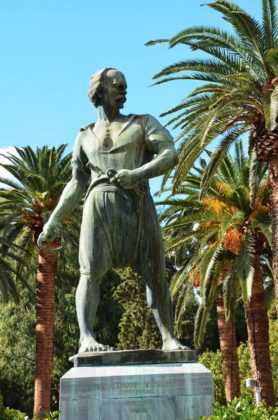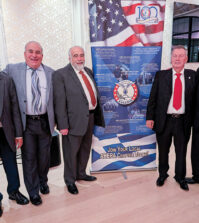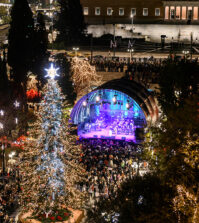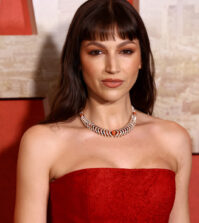The Revolution
His wife and his son stood apart at the railing of the ship while he stood back and smoked along with the old man with the hairy arms and striped shirt and the one gold tooth where the smoke seemed to gush out like steam.
“How are you?” the old man said and nodded at him.
He nodded back at him.
“Good,” he told the old man.
They smoked together and watched the ship gliding through the dawn into port.
“Are you from Chios?” the old man said politely, with smoke gushing out of his nostrils.
“I was born here,” he told him.
The old man nodded, smiled, gushed more smoke through his nostrils, then chucked his cigarette into the sea.
“What do you do?” the old man asked. “If you don’t mind me asking?”
“I’m an economist,” he told him.
“Oh, very good,” the old man said and rubbed his fingers together. “Money?”
He nodded. “Yes, money,” he said.
The old man nodded again, and together they watched the ship edge into the harbor past the two blinking harbor lights. His son stared at them more than he stared at the island just beyond, the houses and trees looking like miniatures, the streets wrapped in a gauzy morning light, the scooters with the boxes strapped to their backs scuttling like bugs suddenly exposed to the light.
He nodded at the old man once more, the old man nodded at him, and then he walked over to his wife and son and they all looked over the gray and brown bulk of the island, like some shaggy beast, except his son was looking down the side of the ship more at the flicker of the water.
“That’s where I took the ship long ago and I came to America,” he told his son, pointing at the dock.
His son squinted in that direction, but then looked down at the water again.
His wife kept her two hands resting on the boy’s shoulders and smiled at nothing in particular, because she was not from the island and had never been to Greece. This was a business trip for him to sell his grandparents’ farm before the government claimed it, and for him to see it one more time, before they took the accustomed tour of Mykonos and Santorini and Athens.
“We’re just staying in Chios until I finish my business,” he had promised her.
And she had smiled agreeably.
But his son did pack most of his video games and he played them relentlessly on the plane and even in the cab in Athens that brought them to the ferry for Chios, and, of course, the hours during the voyage.
“You can put them away for now,” his mother told him as the ship reached Chios at dawn.
And the boy did as his mother said: if his father had told him he would have shied away from him the whole trip.
When the ship finally docked, the old man with the hairy arms gestured a goodbye to him and the family, and then swaggered across the ramp of the ferry and disappeared into the streets. His wife stood with both hands on her son and waited for him to guide them. He looked up and down the line of shops, all of them still closed, but then he spotted the sign of the rental car place, where the men were already sitting outside at the tables, and one of them was hosing down the sidewalk, and he told his wife to wait with his son by the luggage while he walked down the length of the dock to the rental car office.
He avoided the man hosing down the sidewalk and nodded at the men sitting at the tables, one of them flipping a string of worry beads with black and white beads and silver filigree.
“Kalimera,” he said to them.
“Kalimera,” they all said to him in unison.
They all stared at him as he walked into the “office” of the rental car place, a big empty room with cardboard boxes on the floor, and he stood staring at the walls, until a woman stumbled in barefoot and slipped into her flip flops.
“Kalimera!” he said to her a little too eagerly with his newfound Greek.
“Malista,” she said to him pleasantly. And then she talked a blizzard of Greek to the man with the hose and said to him again–“He would be coming–” in English, before she disappeared out the same door.
And while he waited for the one who “would be coming” he stared at the framed print on the floor against one of the walls that showed a hero of the Greek revolution: a typical hero with a flaring mustache, pillbox hat, braid over one shoulder, fluffy white shirt and brocaded vest, and, of course, all the pistols and sabers in his belt. If his son were there he would have shown it to him: You see that? That’s what I dressed as during the March 25 celebration at school every year. I wore all that—except I had cowboy pistols and a sword made of wood that I painted silver! He smiled thinking about it, but his son would probably just stare at him: his son went to a suburban school far from the Greek church and the Greek school he himself had once attended: the building of the Greek school was now being rented out to a charter school.
“Hello, hello,” the man with the hose came tumbling into the room and slipped into his sandals. “You want car?” he said to him in English.
They rented a Hyundai, it seems the only automatic on the island, and they cruised by all the little stores that were now opening in the flare of the morning sunlight, and they whisked by the old horse trough and vrisi the Turks had once erected and which still had Turkish characters on it faded with age like an old sugar cube.
“You see that?” he told his son as they sailed by. “It’s been used for almost two hundred years: only the Turks were allowed to use it.”
His son stared ahead: his wife smiled into the sunlight.
“And you see the kastro?” he told his son as the old Byzantine castle floated by with its crenelated walls. “First the Byzantines built it, and then the Genoese. And then the Turks took over—and that’s where they killed the leading citizens.”
His wife smiled at him, reproachfully, because now his son’s eyes were twice as large now.
“Only the Greeks won the war,” he reassured the boy.
But the boy’s mouth was still hanging open.
When they got to his grandparent’s house, long abandoned, the blue-washed walls were still there, the gate was still green, the silver Egyptian door knocker was still silver and hanging from the front door, and the old olive tins still lined the taratsa, except they were hollow and empty and without his grandmother’s flowers in them that always perfumed the night air.
He shoved open the front door of the house and looked inside, but the floor beams had rotted, the walls had moulted, his grandmother’s bed that doubled as a couch had no mattress and just springs.
His wife stood behind with his son.
“I haven’t seen this place in forever,” he said.
“Has it changed a little bit?” she said to him sympathetically, or ironically.
No chickens were clucking this time as they left the house and walked down the road to the neighbor’s house, still drenched in shade, still spilling over with flowers and plants in the garden drenched in sunlight, as he always remembered it.
He opened the blue gate, the same old blue gate, he walked down the broad steps that led to the house with the timbers holding up the taratsa and creating shade, and he stood on the flagstones and tried to remember where the door was—when he was a kid he used to walk into the house like it was his own.
And then a woman came out wiping her hands on her apron: you couldn’t miss her curly hair and her freckles.
“Is that you?!” she said to him in Greek.
“Is that you!” he said to her in Greek.
After she hugged him and squeezed him, she finished wiping her hands on her apron and she clapped up the steps in her slippers and went to hug his son and then to formally kiss his wife on both cheeks.
“Elate, elate, elate!” she told them, clapping down the steps again.

The statue of Admiral and hero of Greek Independence Constantinos Kanaris in Chios
Her name was Polixeni and she was married to Panteli, the boy with the buck teeth who used to come out of his house in the morning singing, and who used to tell them tall tales that nobody believed, but they liked him, anyway, because his stories were so funny and his singing was like everybody’s morning radio alarm. Only now he was a chiropractor and also ran a pharmacy.
“You know your father was my best friend!” he told the boy.
They played together like all the kids in the neighborhood.
“If I didn’t see him in the morning and he didn’t see me we thought something was wrong!” Panteli told the boy.
And sometimes you didn’t want to see Panteli in the morning because he was always singing in your ear.
“We used to kill sfikes together,” he said.
That was true: they used to poke the wasp nest and then go running as the wasps came out with their wings buzzing and their stingers out.
“And what I didn’t know about the Greek revolution in Chios, your grandfather would tell me!” he told the boy. “And what did we find in the river?” he turned to him suddenly.
“What did we find…?” he said and thought about it. “We found a Turkish saber once.”
“Hooked like this!” said Panteli to the boy again, and he made a hook with his finger. “And what else did we find…?” he asked him again.
“Some buttons…” he thought about it and replied.
“Military buttons!” said Panteli to the boy. “From a Turkish uniform! And when you go into the pareklisi…?” he asked him again in English this time.
“Stop scaring the boy!” Polixeni said finally, passing around the bowl of cubed cantaloupe. “Talk about something nice!”
“…When you walk into the pareklisi you see footprints on the floor,” Panteli told the boy, his fingers spreading wide, and his eyes growing wider. “From the Turks walking in Greek blood…”
His wife gave him a shove, but Panteli nodded solemnly, and then he speared a cube of cantaloupe and stuck it in his mouth.
Panteli gave the boy a picture book with a glossy cover, of Kanaris blowing up the Turkish fleet with his fireship, and Polixeni gave him another picture book about ducks—“Because I work in a school with little kids, kaimeno mou, and that’s all I have to give you!”–before they took a cab back to the town and their hotel, the cab sailing past the kastro again looming in the sky with its turrets showing like jagged teeth, and past the Turkish horse fountain and trough like a big cube of sugar, and as the car crossed the square his wife noticed the ice cream store across from the municipal park that was still open and whose light was spilling into the square.
“You want some ice cream?” she asked their son.
The cab dropped them off and they sat at one of the outdoor tables in the square and watched the cars floating past them out of the night, like moths around a flame, but he noticed the boy kept looking at the book and then looking at the statue of Kanaris at the entrance to the park.
“That’s the same guy,” he told his son.
The boy looked from one to the other: he held the book like a tablet on his lap.
“Who was he?” he asked his father.
They ordered their ice cream from the waiter who bounded across the street through the traffic, and then bounded back again.
“He was a fisherman,” his mother told him.
The boy looked from the statue to the book.
“So why did he blow up the ship?” he asked his father.
“Because the Turks had captured the island and he wanted to free the island,” he told the boy.
The boy stared at his mother, and then at him again.
“But he was a fisherman,” he told his father.
“But he was also a brave man,” he told his son.
“So where was the army?” the boy said.
“That was the army,” he told him. “You, and me, and everybody else was the army. We helped to make Greece free. Even the fishermen.”
His wife smiled. “Especially the fishermen,” she said. “Fisherman had to be very brave.”
He smiled at his wife, she smiled back at him, and they both smiled at the boy, who opened up his book and almost ignored his ice cream when the waiter brought it over from across the street.
And after they finished their ice cream they walked into the park through the aroma of the flowers, and they stood in front of the statue of Kanaris, holding his rope of fire and ready to fling it.
“Was he really that big?” the boy said.
“Bigger,” his mother said.
“Almost as big as you,” his father told him and smiled.
And the boy reached out for his hand, and they walked through the park together holding hands, while the boy looked back at the statue of Kanaris, and they also passed the Turkish horse fountain.















0 comments